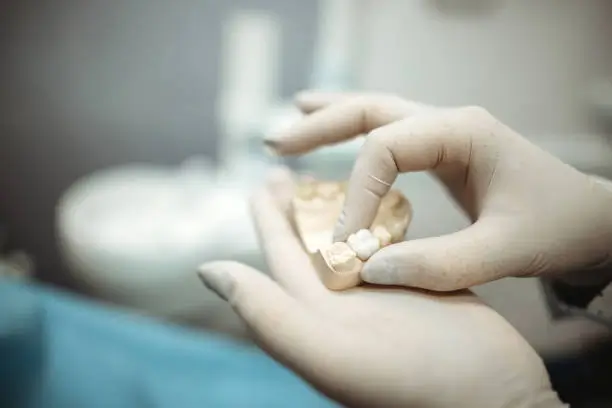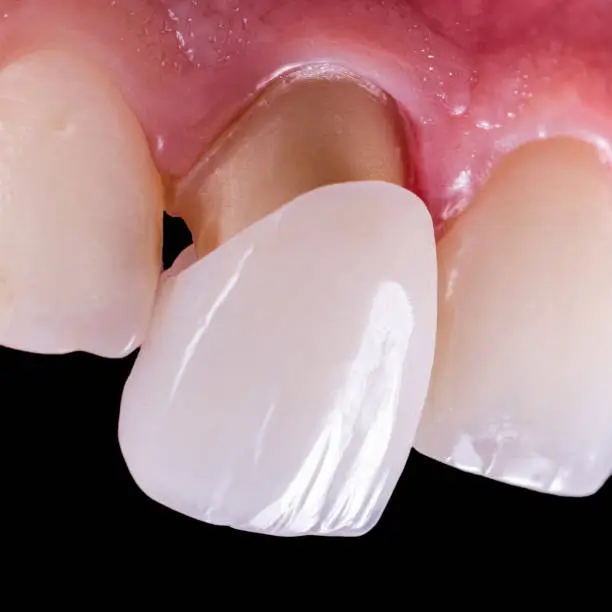
So, you're wondering, how long do dental crowns last? It's a great question and one that many people have when considering dental crowns. After all, you want to make sure that any investment in your smile is going to stand the test of time.
In this guide, Schroeder & Schroeder Dentistry will dive into everything you need to know about the lifespan of dental crowns and how you can ensure yours lasts as long as possible.
A dental crown is a cap placed over a tooth to restore its shape, size, strength, and appearance. Crowns are used to protect weak teeth, restore broken teeth, cover dental implants, or improve the appearance of discolored or misshapen teeth.
Dental crowns serve several essential functions:
The lifespan of a dental crown depends on several factors.
The material of the crown significantly affects its durability and longevity.
Metal crowns, made from gold or other alloys, are highly durable and can last for many years. However, their metallic appearance may not be suitable for visible teeth.
Porcelain crowns are popular for their natural appearance but can be prone to chipping and cracking.
These crowns combine the durability of metal with the natural look of porcelain, offering a balanced solution.
Resin crowns are more affordable but tend to wear down more quickly than other materials.
Proper dental hygiene practices are crucial for extending the lifespan of crowns.
Regular brushing and flossing help prevent decay and gum disease around the crown, ensuring it stays in good condition.
Routine dental checkups and professional cleanings help maintain the health of both the crown and the underlying tooth.
Certain habits and dietary choices can impact the longevity of dental crowns.
Avoid chewing hard foods like ice, nuts, and hard candy, which can damage the crown.
Teeth grinding can wear down the crown. Using a night guard can help protect your teeth and crowns.
Clenching your teeth can also damage crowns. Stress management techniques and night guards can be helpful.
The average lifespan of dental crowns varies based on several factors.
On average, dental crowns last between 10 to 15 years with proper care. This average is based on typical usage and maintenance. However, many patients experience crowns that last much longer, especially with meticulous care.
The durability of the crown also depends on its location in the mouth. Crowns on molars, for example, may experience more wear and tear due to the pressure of chewing.
Different materials have different expected lifespans.
Metal crowns, particularly those made from gold or platinum, are known for their exceptional durability.
These crowns can last for several decades, often outlasting other types of crowns. They are less likely to chip or break, making them a long-term solution for dental restoration.
Porcelain crowns typically last between 10 to 15 years. While they offer excellent aesthetics, their durability can be compromised by chipping and cracking.
However, advancements in dental technology have made porcelain crowns more resilient, potentially extending their lifespan with proper care.
Resin crowns have a shorter lifespan compared to metal or porcelain crowns. Typically, resin crowns last around 5 to 7 years.
They are more susceptible to wear and tear and may need to be replaced more frequently. However, their affordability makes them a viable option for many patients.
It is important to recognize the signs that a dental crown needs to be replaced.
Visible chips or cracks indicate that the crown may need to be replaced.
A loose crown can allow bacteria to enter, causing decay. It should be addressed promptly.
Persistent pain or sensitivity around the crowned tooth can indicate an underlying issue.
Decay around the edges of the crown is a clear sign that it needs to be replaced.
A broken crown requires immediate replacement to protect the tooth.
There are several ways to extend the lifespan of your dental crown.
Maintain good oral hygiene by brushing twice a day and flossing daily.
Regular dental visits are essential for early detection and prevention of issues.
Avoid using the crowned tooth to chew hard foods to prevent damage.
Using a night guard can protect your crowns and natural teeth from grinding damage.
There are alternative treatments to dental crowns depending on the extent of the damage.
Inlays and onlays are less invasive than crowns and can be effective for smaller areas of damage.
Dental fillings are suitable for minor cavities or damage, requiring less tooth preparation than crowns.
The cost of dental crowns depends on several factors.
Different materials have different costs, with metal crowns typically being more expensive than resin crowns.
Check with your dental insurance provider to understand what is covered and what you will need to pay out of pocket.
At Schroeder & Schroeder Dentistry, we are dedicated to providing top-quality dental care. Our experienced team offers a wide range of services, from routine checkups to advanced dental procedures. We are committed to helping you achieve and maintain a healthy, beautiful smile.
Our state-of-the-art facility is equipped with the latest dental technology, ensuring that you receive the highest quality care. We prioritize your comfort and satisfaction, making your visit to the dentist a positive experience.
Whether you need a new crown, a replacement, or routine dental care, Schroeder & Schroeder Dentistry is here to help. Schedule your appointment today and let us take care of your dental health.

In summary, the lifespan of dental crowns depends on the material, dental hygiene practices, and oral habits. On average, crowns last between 10 to 15 years, but with proper care, they can last longer. Regular dental checkups, good oral hygiene, and avoiding damaging habits are key to extending the lifespan of your crown.
If you have any concerns about your dental crown or need a new one, Schroeder & Schroeder Dentistry is here to assist you. Our professional team is ready to provide you with the best dental care possible. Contact us today to schedule your appointment.
When emergencies arise, please call us immediately so we can fit you into our schedule as soon as possible. We will work quickly to help get you out of pain and prevent any harm to your smile until you can return for any further care you need.

In June, I started calling different places to become a patient with a new dentist since I moved to a different side of town! I was welcomed with open arms through the phone with Mrs. Jane and we actually had a friend in common... what a small world.
She sent me the paperwork I needed to fill out prior to coming to my first appointment. I initially came in for a general cleaning since it's been a year, but I knew deep down inside I really needed to get my two sets of bridges in place as well. I've honestly been dreading this procedure for the last 5 years due to the unknown, but Dr. Miles showed me a video and of course I had a lot questions.
I had learned that I could get both done at the same time, and it would be cheaper too. So with several visits to the dental office, I finally received my permanent bridges on Thursday, August 8th. I am happy camper for sure and after the anesthesia subsided and of course after taking a nap... all I could think about was eating I nice big ole steak from Texas Roadhouse! I couldn't believe I could chew on both sides of my mouth because for the past few years I would only chew on the right side!
If I could give your practice 10 stars I would because the staff were relatable, funny and truly cared about me...I wasn't just another patient or another number! I can truly say my smile is brighter than ever because I am no longer self-conscious about my back missing teeth.
Ooh and one more thing, I even received a thank you card in the mail after my first visit and it truly made my day. 😁 I would recommend Schroeder & Schroeder Dentistry to anyone!!
"*" indicates required fields
Plan your visit today! Check out our office hours below